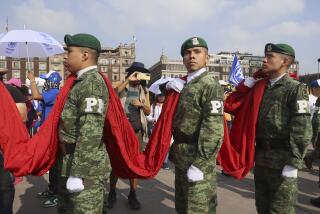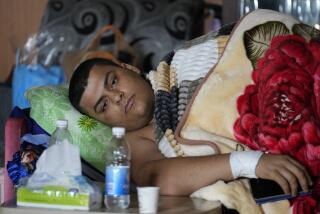Surge in Violence Leaves 30 Dead
- Share via
BAGHDAD — Insurgents on Monday unleashed their most violent assaults in Iraq since the country’s election, killing 15 people in mortar and suicide attacks in the northern city of Mosul and 15 more in a car bombing near a police station northeast of Baghdad.
Turmoil reasserted itself as a new batch of election returns indicated that an ethnic Kurdish coalition had garnered more than 1 million votes in two northern provinces.
The strength of the Kurdish turnout -- with results from one Kurdish province still to come -- indicates that a Shiite Muslim coalition put together by interim Prime Minister Iyad Allawi will place third, behind the Shiite coalition of Grand Ayatollah Ali Sistani and the Kurds. That would diminish Allawi’s chances of playing a top role in the next government.
Results from the Jan. 30 balloting also appeared to confirm low voter turnout in Salahuddin province, the mostly Sunni Muslim central region that includes the cities of Samarra and Tikrit, home to deposed President Saddam Hussein’s clan.
Monday’s attacks could be an indication that the insurgents were trying to reassert themselves after millions of Iraqis defied the rebels’ warnings not to vote.
As has been the case in recent months, Iraqi police and recruits bore the brunt of the violence.
In Mosul, a man carrying a bomb managed to enter a hospital zone containing a group of police. The explosion killed the bomber and 12 officers. Four others were wounded.
“I didn’t see anything before the blast. We were just talking and laughing,” said Sabah Jabbar, 21. “All I remember was seeing this body set ablaze, then I lost consciousness.”
Another man, who declined to give his name, said he thought he had seen a man in bluejeans and a brown jacket coming quickly toward him just before the explosion. “I am not sure it was him,” he said. “Now it just seems like I am seeing it in a dream.”
Mortar attacks in Mosul killed three civilians. Some of the insurgents’ strongest attacks in recent months have occurred in that city. Some rebels are thought to have moved there after their stronghold of Fallouja was taken by U.S. Marines in November.
In Baqubah, a farming center northeast of Baghdad on the edge of the so-called Sunni Triangle, roadblocks prevented a car bomber from reaching a police station that was the apparent target.
The car exploded near scores of young men who were waiting in line to enlist. Besides the 15 killed by the suicide bomber, 17 people were injured, some seriously, said Lt. Col. Mohammed Jassim, spokesman for the Diyala provincial police.
In U.S. Senate testimony last week, Deputy Defense Secretary Paul D. Wolfowitz estimated that 1,342 Iraqi soldiers and police had died “fighting for a new Iraq.”
He said that the estimate was probably low, and it was not clear whether it included the scores of recruits who had been killed in attacks at recruiting centers.
More than 1,400 U.S. troops have been killed since the war began in March 2003.
The vote counting continued, with the Kurds, who represent about 15% of Iraq’s population, showing their ability to transform ethnic pride into political muscle.
In Dohuk province in the north, a coalition endorsed by the two main Kurdish parties garnered nearly 370,000 votes, whereas no other party managed more than a few thousand. In Sulaymaniya, another Kurdish stronghold, it was only slightly less lopsided: The main Kurdish front won 671,000 votes, compared with about 40,000 for a Kurdish Islamic party.
Authorities have not yet said how many votes were cast nationwide, making predictions difficult. But it seemed clear based on the accumulated partial results that the Kurds were running a strong second, dominating their region as the Shiites have dominated returns from the south.
Election officials have given no results from Al Anbar, the violence-torn province that includes Fallouja, Ramadi and other Sunni Arab tribal areas that have been the center of resistance to U.S.-led forces.
It is believed that many Iraqis in the province decided not to vote, either out of fear or because they were heeding Sunni clerics’ call for a boycott.
With 80% of ballots counted in Salahuddin, the pro-Sistani Shiite list led with 27,645, followed by the Kurdish coalition at 18,791. That Sistani’s list would do so well in a province where Sunnis are a majority was a sign that the Sunnis there had largely sat out the vote.
Election officials are expected to release final returns Thursday. Shiite politicians already are discussing plans for the next government, if, as expected, they emerge with an overwhelming majority.
Throughout modern Iraq’s history, the minority Sunni Arabs constituted the political elite. Shocked by the ouster of Hussein and chastened by the evident ascendancy of Shiites during the U.S.-led occupation, many of them now feel alienated and bitter.
Some Shiite politicians have promised to ask Sunnis to participate in drawing up a new constitution, even if the final election results leave them poorly represented in the transitional national assembly.
At a news conference Monday, two officials of Iraq’s independent electoral commission addressed complaints of irregularities in and around Mosul. They acknowledged that security concerns there had meant that only about a third of the polling stations were able to operate and that many voters were subjected to intimidation and harassment.
More to Read
Sign up for Essential California
The most important California stories and recommendations in your inbox every morning.
You may occasionally receive promotional content from the Los Angeles Times.










